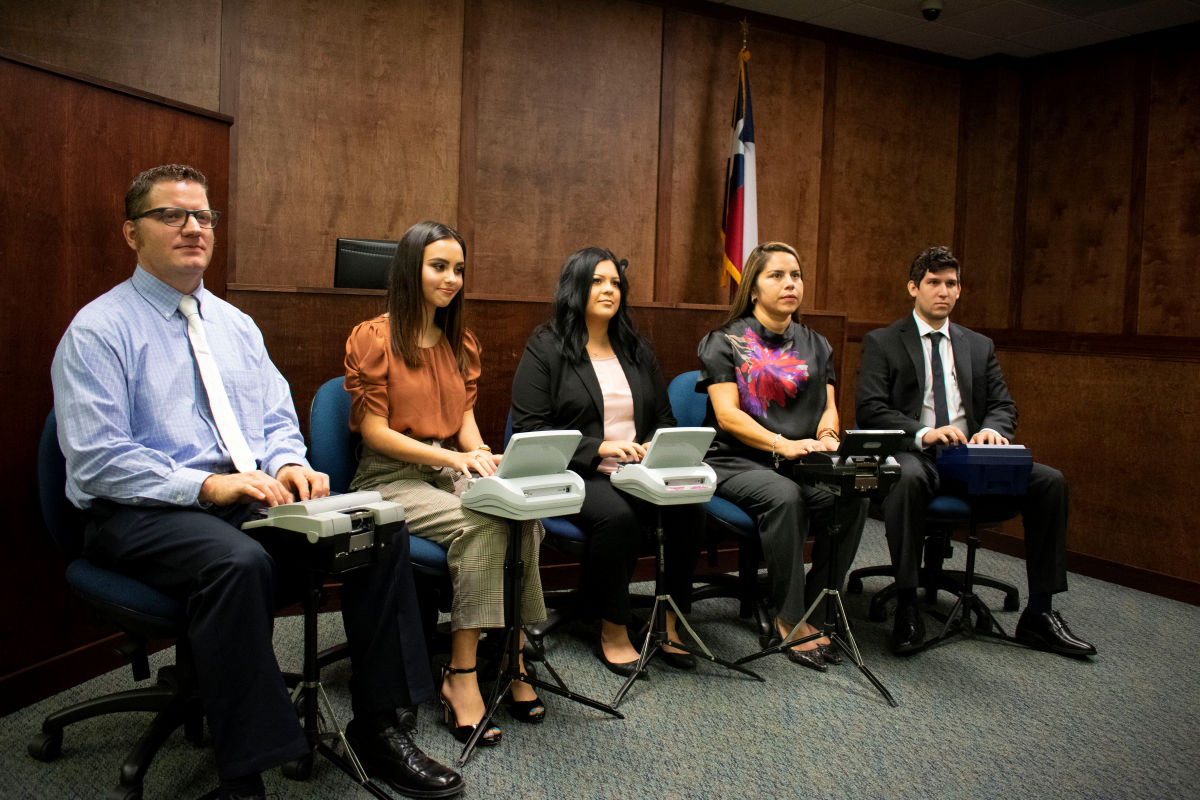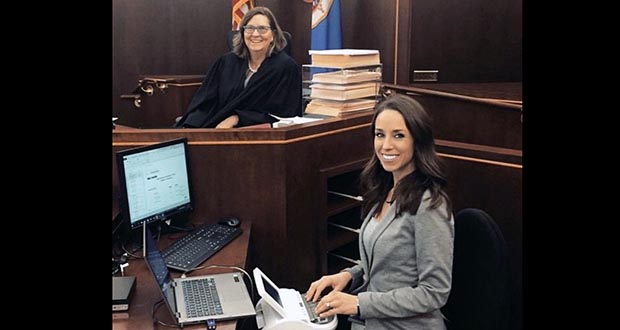Everything About Court Reporting: Important Insights Into Its Significance in Legislation
Court reporting serves an essential feature within the lawful structure, offering a precise and trusted record of process. Via innovative methods and devices, court reporters capture the nuances of testaments and lawful dialogue. The relevance of their work extends beyond plain transcription. As the legal landscape advances, so as well does the duty of technology in court reporting. Comprehending these dynamics exposes much deeper ramifications for justice and openness in the legal system.
The Role of Court Reporters in the Legal System

Although often overlooked, stenotype reporter play a necessary role in the legal system by guaranteeing a precise and verbatim record of proceedings. Their main obligation entails recording talked words during tests, depositions, and other legal occasions, which works as a main record for future referral. This paperwork is necessary for allures, as it offers the needed information for evaluating choices made by juries and courts.
Court press reporters need to possess exceptional paying attention skills and a deep understanding of legal terminology to record the nuances of testament and argumentation accurately. Their work contributes to openness within the judicial procedure, enabling liability and fairness. Furthermore, they facilitate accessibility to justice by making records available to involved events, making sure that everyone has the chance to assess the process. By doing this, stenotype reporter copyright the honesty of the lawful system, enhancing the importance of precise communication in matters of regulation.
Tools and strategies Made use of in Court Reporting
In court reporting, numerous techniques and tools enhance the precision and performance of transcription. Stenography innovation plays a substantial function, permitting press reporters to capture spoken words quickly, while electronic recording approaches supply alternative options for paperwork. Comprehending these devices is crucial for grasping how stenotype reporter satisfy their vital function in the lawful system.
Stenography Modern Technology Introduction
Stenography innovation acts as the cornerstone of modern court reporting, enabling reliable and specific transcription of spoken dialogue. Making use of specialized makers called stenographs, stenotype reporter can record speech at amazing rates, typically exceeding 200 words per minute. These equipments utilize a special key-board layout that permits several tricks to be pressed simultaneously, producing phonetic representations of words - durham court reporting. This approach minimizes the requirement for comprehensive punctuation and improves transcription accuracy. Furthermore, stenographers utilize different shorthand techniques and symbols to further improve the procedure, making certain that no detail is ignored during procedures. The integration of stenography technology not just promotes reliable communication in lawful settings but likewise maintains the stability of the judicial procedure by offering reputable and precise records of conversations
Digital Recording Approaches
An enhancing variety of court reporting specialists are transforming to digital recording methods to improve the precision and performance of their transcriptions. These methods use advanced audio and video technology to catch procedures in real-time. Digital recorders, frequently combined with premium microphones, assure that every word spoken is protected with clearness. Specialized software application can transcribe audio documents instantly, permitting for quicker turn-around times. Some specialists integrate double recording systems for redundancy, assuring no essential information is lost. In addition, digital recordings can be easily indexed and browsed, facilitating quick retrieval of details sectors. As lawful atmospheres advance, embracing these electronic devices not just simplifies the reporting process however also keeps the honesty of the document.
The Relevance of Precision in Transcription
Precision in transcription is necessary in court reporting, as it assures that legal documents reflect the true content of proceedings. This accuracy can significantly influence situation end results, influencing the choices made by courts and judges. Maintaining high criteria of accuracy is vital in the legal career.

Accuracy in Lawful Records
Although the lawful system depends heavily on eloquent arguments and persuasive unsupported claims, the real foundation of judicial procedures hinges on the accuracy of legal records. Accurate transcription is necessary, as it assures that every declaration, question, and judgment is recorded correctly. Such precision serves numerous objectives, including offering a trusted reference for allure procedures and maintaining the stability of the judicial system. Mistakes in transcription can result in misconceptions, misinterpretations, and potentially harmful consequences for all events included. Court press reporters must possess exceptional skills and focus to information, as their work directly affects the quality of lawful have a peek at these guys records. Eventually, the accuracy of lawful records underpins the trust fund positioned in the judicial process, reinforcing the relevance of careful transcription.

Influence On Situation Outcomes
When legal process unravel, the precision of transcription often determines the trajectory of a case's result. Exact court reporting assurances that every word talked is effectively captured, allowing attorneys, courts, and courts to make educated decisions based upon the document. Mistakes in transcription can bring about misconceptions, misinterpretations, and possibly unjust decisions. The integrity of lawful papers counts heavily on the precision of these documents, as they work as the structure for charms and additional lawful activities. In high-stakes situations, where the implications are profound, the function of a court reporter ends up being a lot more crucial. Keeping rigorous standards in transcription not just supports the legal procedure however additionally promotes the principles of justice and justness in the courtroom.
Court Reporting in Different Lawful Settings
Court reporting plays an essential duty across numerous legal setups, ensuring that procedures are properly recorded for future recommendation. In criminal court, court reporters record testimonies, evidence, and judicial rulings, which are essential for appeals and instance testimonials. In civil lawsuits, precise records help with the exploration process and provide a trustworthy document for trial procedures. Additionally, management hearings commonly rely upon court reporters to keep an official record, ensuring openness and accountability in governmental processes. Family members courts likewise take advantage of court reporting, as exact documents of procedures can influence wardship decisions and settlements. In addition, depositions in pre-trial phases call for exact recordings to record the nuances of witness statements, which might be substantial fit instance strategies. In general, court reporting offers as a keystone in the legal system, fostering justness and clearness throughout varied judicial environments.
The Influence of Modern Technology on Court Reporting
As technology proceeds to develop, its influence on court reporting has actually become progressively substantial. Advancements such as electronic recording, real-time transcription software program, and expert system have actually transformed standard techniques. Digital audio recorders now catch court proceedings with exceptional clarity, allowing stenotype reporter to concentrate on subtleties and context instead than solely on inputting. Real-time transcription technologies make it possible for prompt accessibility to transcripts, promoting performance and boosting collaboration among lawyers. In addition, expert system devices are being incorporated to aid in the transcription procedure, lowering human error and quickening paper generation. Despite these developments, the crucial abilities of stenotype reporter remain indispensable, as they give a nuanced understanding of legal language and court room dynamics. Inevitably, modern technology matches as opposed to replaces the expertise of court press reporters, making certain that the integrity and precision of lawful documents are maintained useful content in a progressively electronic landscape.
Occupation Opportunities and Pathways in Court Reporting
The development of innovation in court reporting has opened a range of profession chances for striving experts in the field. Typically, court reporters were primarily liable for recording legal procedures. Developments such as electronic recording and real-time reporting have expanded their roles.
Today, stenotype reporter can focus on areas such as captioning for transmission, giving transcription services for legal companies, and functioning in the business sector for conferences or depositions - durham court reporting. Furthermore, possibilities in remote reporting, specifically as a result of the rise of virtual court rooms, have actually become progressively widespread
Educational paths include official training programs, certification programs, and proceeding education to stay upgraded with technological modifications. Networking within expert and lawful companies also plays a considerable duty in career improvement. On the whole, the diverse chances in court reporting mirror the vibrant nature of the legal occupation and the boosting need for experienced experts.
The Future of Court Reporting in an Evolving Legal Landscape
Just how will the duty of court reporting adjust as the lawful landscape remains to develop? As innovation developments, court reporting is most likely to welcome cutting-edge devices such as fabricated knowledge and real-time transcription software program. These advancements may boost precision and performance in recording lawful process. In addition, find here the raising frequency of remote hearings demands that stenotype reporter come to be skilled in electronic platforms, guaranteeing seamless documents despite area.
All at once, court press reporters will require to adjust their skills to take care of brand-new types of instances, such as those entailing cyber legislation and copyright conflicts, which call for specialized understanding. Additionally, the need for instant accessibility to transcripts will certainly push specialists to provide quicker turnaround times without jeopardizing quality. Inevitably, the future of court reporting will rest on a balance between traditional abilities and technological assimilation, ensuring that the integrity of the legal process remains undamaged in a significantly electronic world.
Regularly Asked Questions
Exactly How Do Stenotype Reporter Handle Delicate Info During Process?

What Certifications Are Needed to Come To Be a Court Reporter?
To become a stenotype reporter, people usually need a secondary school diploma, specialized training from a recognized program, efficiency in shorthand or voice writing, and certification or licensure, relying on state needs and guidelines.
Are Court Reporters Required to Have a Certificate?
Court reporters are frequently required to acquire a license, depending on the jurisdiction. Licensing warranties that they fulfill details requirements of effectiveness and expertise, which is essential for keeping the integrity of legal procedures.
Just How Do Stenotype Reporter Manage Various Accents and Dialects?
Court reporters take care of different accents and languages with comprehensive training, practice, and experience with various speech patterns. They often use specialized software program and techniques to properly catch talked words, making certain clarity and accuracy in their records.
What Is the Ordinary Income for a Court Press reporter?
The ordinary income for a stenotype reporter differs by area and experience, usually varying from $50,000 to $80,000 each year. In high-demand areas, salaries can go beyond $100,000, showing the profession's relevance and specialized skills.
Often forgotten, court press reporters play an important duty in the legal system by guaranteeing a exact and verbatim document of process. In criminal court, court reporters transcribe testimonies, evidence, and judicial judgments, which are essential for allures and case reviews. Family courts additionally benefit from court reporting, as exact documentation of process can influence wardship decisions and negotiations. Commonly, court reporters were largely accountable for transcribing lawful process. Today, court press reporters can specialize in areas such as captioning for television programs, supplying transcription services for legal firms, and functioning in the company industry for depositions or conferences.